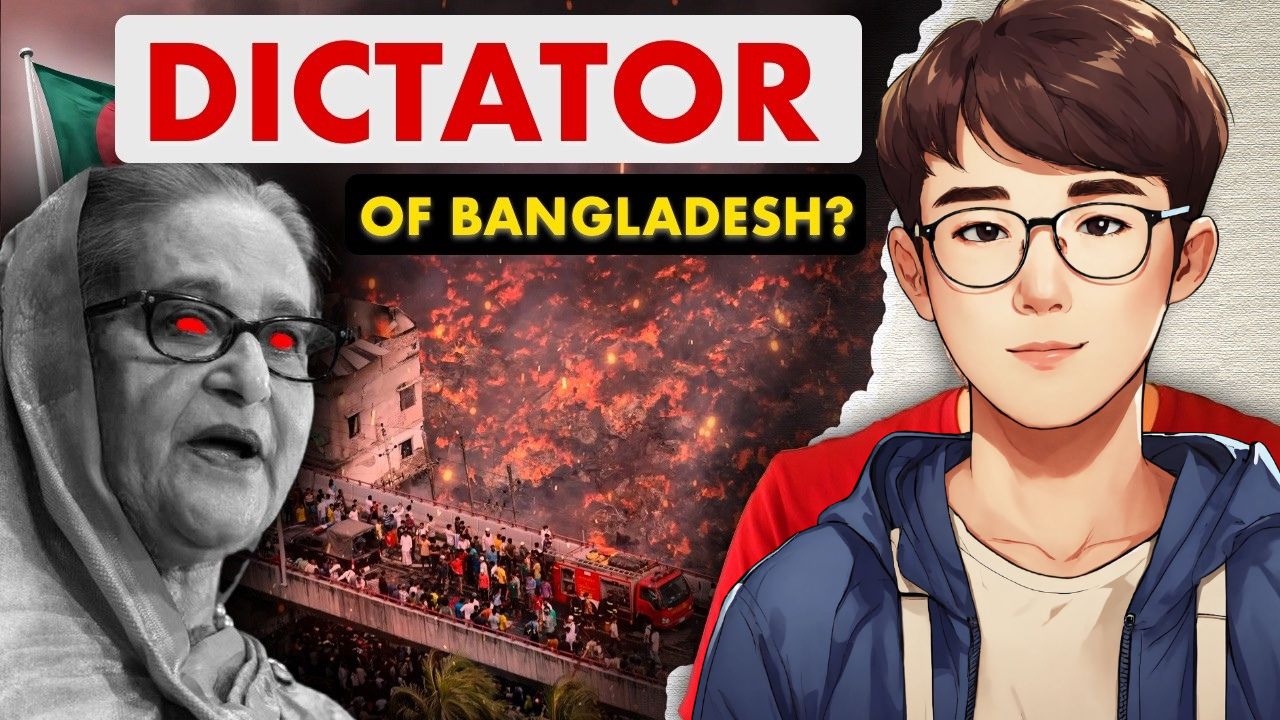Bangladesh is Burning! | Sheikh Hasina called a Dictator | What’s Happening? | Dhruv Rathee
Schools and colleges across the country have been shut down, and Bangladesh’s government has suspended mobile internet services. These actions have been taken in response to the escalating protests and unrest in the country.
Rising Tensions and Government Response
“If freedom fighters’ grandchildren don’t deserve it, do the oppressors and their grandchildren deserve it?” Such low-level arguments do not suit a Prime Minister. Bangladesh’s Prime Minister Sheikh Hasina is now being called a dictator by the protestors. The situation, which started as peaceful protests by students last month, has now turned violent, leading to a military curfew being declared across Bangladesh. Troops are on the streets, and a strict curfew has been imposed, with communication nearly blacked out.
Violent Clashes and Casualties
In the violent clashes that have erupted, at least 150 people have been killed, and thousands are injured. Protestors are now labeling Prime Minister Sheikh Hasina as a dictator. But what is the reason behind all this turmoil?
The Quota System Controversy
The root cause of these protests is the reservation or quota system in Bangladesh. The youth are protesting against the government’s quota system, which reserves 56% of jobs in the public sector for various sections of society. This leaves only 44% of jobs available based on merit. Unlike India, where reservations are primarily caste-based, the majority of Bangladesh’s reservations are related to freedom fighters.
Historical Context: Bangladesh’s Independence Struggle
To understand the significance of this quota system, one must delve into Bangladesh’s history. Before gaining independence, Bangladesh was part of Pakistan, known as East Pakistan, while present-day Pakistan was called West Pakistan. The people of East Pakistan faced severe social, economic, and political discrimination, leading to the Bangladesh Liberation War of 1971. With India’s assistance, Bangladesh gained independence, and the freedom fighters who played a crucial role in this struggle became a revered group in the country.
The Freedom Fighters’ Quota and Its Evolution
The current protests are centered around the reservation system that reserves 30% of jobs for the descendants of these freedom fighters. Initially, in 1972, this quota was only for the freedom fighters themselves. Over the years, it was extended to their children in 1997 and then to their grandchildren in 2010. The recent decision to reintroduce this quota system after it was removed in 2018 has sparked nationwide protests.
Allegations of Corruption and Political Bias
Protesters claim that the freedom fighters’ quota has been misused for political gain. The ruling Awami League party, led by Prime Minister Sheikh Hasina, has been accused of disproportionately benefiting from this system. There have been at least 60,000 objections to the names included in the list of freedom fighters, and these objections remain unresolved.
Legal Battles and Renewed Protests
In June 2024, the High Court of Bangladesh reinstated the quota system, leading to a resurgence of protests. The Supreme Court has since stayed the High Court’s order, but the protests have continued, drawing in students, teachers, and opposition parties. The government’s response has been to deploy over 7,000 paramilitary troops and use tear gas, rubber bullets, and sound grenades against the protestors.
International Reactions and Internal Struggles
The United Nations Secretary-General has called on the government to refrain from using threats or violence against the protestors. Meanwhile, the government’s Law Minister has stated that they are willing to negotiate with the protestors and are seeking an early hearing in the Supreme Court.
Political Manipulation and Media Criticism
Prime Minister Sheikh Hasina’s response to the protests has been criticized for being dismissive and inflammatory. She has accused the protestors of disrespecting freedom fighters and suggested that if the grandchildren of freedom fighters don’t receive reservations, then the grandchildren of “Razakars” (a term used for collaborators with West Pakistan during the 1971 war) might benefit instead. These statements have been condemned as divisive and manipulative.
Unemployment: The Underlying Issue
While the protests are ostensibly about the reservation system, the real issue appears to be the lack of job opportunities in Bangladesh. Unemployment is a significant problem, with over 30 million people in the country currently unemployed. The government has been criticized for not doing enough to address this issue and for focusing on controversial policies like the quota system instead.
Conclusion: The Need for Change
The protests against the reservation system are symptomatic of deeper issues within Bangladesh, including unemployment and political corruption. While reforming the quota system is a start, the government must focus on creating jobs and addressing the economic struggles facing the country. Prime Minister Sheikh Hasina’s recent remarks have only added fuel to the fire, and it remains to be seen whether she will take a more positive approach to address the concerns of her people.

One Comment